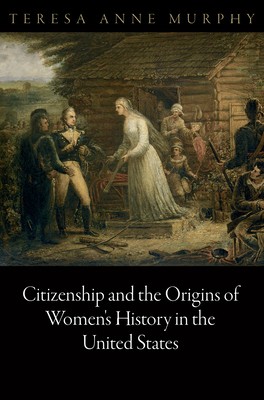
- We will send in 10–14 business days.
- Author: Teresa Anne Murphy
- Publisher: University of Pennsylvania Press
- ISBN-10: 0812244893
- ISBN-13: 9780812244892
- Format: 16.5 x 23.4 x 2.5 cm, hardcover
- Language: English
- SAVE -10% with code: EXTRA
Citizenship and the Origins of Women's History in the United States (e-book) (used book) | bookbook.eu
Reviews
Description
Women's history emerged as a genre in the waning years of the eighteenth century, a period during which concepts of nationhood and a sense of belonging expanded throughout European nations and the young American republic. Early women's histories had criticized the economic practices, intellectual abilities, and political behavior of women while emphasizing the importance of female domesticity in national development. These histories had created a narrative of exclusion that legitimated the variety of citizenship considered suitable for women, which they argued should be constructed in a very different way from that of men: women's relationship to the nation should be considered in terms of their participation in civil society and the domestic realm. But the throes of the Revolution and the emergence of the first woman's rights movement challenged the dominance of that narrative and complicated the history writers' interpretation of women's history and the idea of domestic citizenship.
In Citizenship and the Origins of Women's History in the United States, Teresa Anne Murphy traces the evolution of women's history from the late eighteenth century to the time of the Civil War, demonstrating that competing ideas of women's citizenship had a central role in the ways those histories were constructed. This intellectual history examines the concept of domestic citizenship that was promoted in the popular writing of Sarah Josepha Hale and Elizabeth Ellet and follows the threads that link them to later history writers, such as Lydia Maria Child and Carolyn Dall, who challenged those narratives and laid the groundwork for advancing a more progressive woman's rights agenda. As woman's rights activists recognized, citizenship encompassed activities that ranged far beyond specific legal rights for women to their broader terms of inclusion in society, the economy, and government. Citizenship and the Origins of Women's History in the United States demonstrates that citizenship is at the heart of women's history and, consequently, that women's history is the history of nations.EXTRA 10 % discount with code: EXTRA
The promotion ends in 16d.23:15:13
The discount code is valid when purchasing from 10 €. Discounts do not stack.
- Author: Teresa Anne Murphy
- Publisher: University of Pennsylvania Press
- ISBN-10: 0812244893
- ISBN-13: 9780812244892
- Format: 16.5 x 23.4 x 2.5 cm, hardcover
- Language: English English
Women's history emerged as a genre in the waning years of the eighteenth century, a period during which concepts of nationhood and a sense of belonging expanded throughout European nations and the young American republic. Early women's histories had criticized the economic practices, intellectual abilities, and political behavior of women while emphasizing the importance of female domesticity in national development. These histories had created a narrative of exclusion that legitimated the variety of citizenship considered suitable for women, which they argued should be constructed in a very different way from that of men: women's relationship to the nation should be considered in terms of their participation in civil society and the domestic realm. But the throes of the Revolution and the emergence of the first woman's rights movement challenged the dominance of that narrative and complicated the history writers' interpretation of women's history and the idea of domestic citizenship.
In Citizenship and the Origins of Women's History in the United States, Teresa Anne Murphy traces the evolution of women's history from the late eighteenth century to the time of the Civil War, demonstrating that competing ideas of women's citizenship had a central role in the ways those histories were constructed. This intellectual history examines the concept of domestic citizenship that was promoted in the popular writing of Sarah Josepha Hale and Elizabeth Ellet and follows the threads that link them to later history writers, such as Lydia Maria Child and Carolyn Dall, who challenged those narratives and laid the groundwork for advancing a more progressive woman's rights agenda. As woman's rights activists recognized, citizenship encompassed activities that ranged far beyond specific legal rights for women to their broader terms of inclusion in society, the economy, and government. Citizenship and the Origins of Women's History in the United States demonstrates that citizenship is at the heart of women's history and, consequently, that women's history is the history of nations.

Reviews